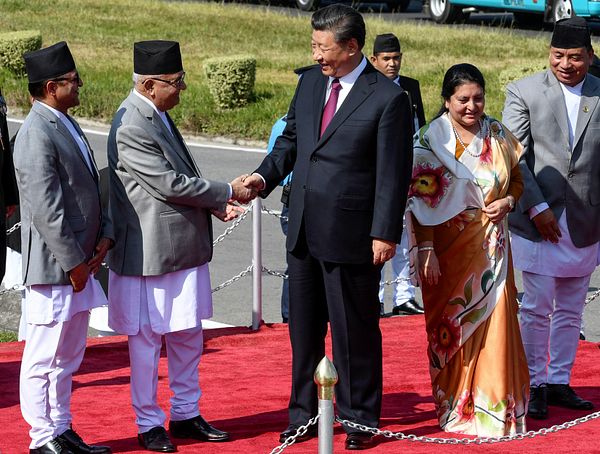With their numerous run-ins with the Indian administration, “Pro-China” Prachanda and KP Sharma Oli have hinted at an uncertain future for India-Nepal relations. On December 26, Pushpa Kamal Dahal, also known as Prachanda, reclaimed his position as prime minister of Nepal by teaming up with the late KP Sharma Oli. The Communist Party of Nepal (Maoist Centre) is led by Prachanda, while Oli leads the Communist Party of Nepal (Unified Marxist-Leninist).
As both communist leaders are primarily believed to have a pro-China stance, the Prachanda-Oli combination taking power in Kathmandu is a reason for concern for India’s strategic interests. This occurs when China and India compete for geopolitical power in Nepal.
How was the Prachanda-Oli Team Able to Make a Comeback?
Nepal has experienced frequent government transitions for many years due to weak coalition governments. These alliances have included different mixes of parties.In one such alliance from July 2021 until December 2022, Sher Bahadur Deuba’s Nepali Congress party and Prachanda’s Communist Party of Nepal (Maoist Centre) were both center-left parties. The time when Deuba served as prime minister. In the election held on November 20, this partnership, however, fell short of securing a parliamentary majority. Deuba turned down Prachanda’s proposal for the prime ministerial post during talks to create the next administration.
Then, Prachanda left the group to join forces with the Communist Party of Nepal, led by the former prime minister and opponent Oli (Unified Marxist-Leninist). They were joined by a few smaller parties as well. The pair returned to power thanks to rekindling a coalition between the two largest communist parties in Nepal. In addition, the two established a partnership and controlled Nepal between 2018 and 2021.
How Does China’s Expanding Footprint in Nepal Affect India
The Prachanda-Oli administration “will not be as sympathetic to India as the Deuba administration,” according to Harsh V Pant, vice president of studies and foreign policy at the Observer Research Foundation. According to Nepali scholar and journalist Akanshya Shah, Delhi would have preferred the earlier alliance between the Nepali Congress and the Communist Party of Nepal (Maoist Centre), as the two communist parties’ reunion benefits China.
According to experts, China is thought to have had a significant role in the 2018–2021 period in uniting the two communist parties since it favors a communist-run government in Kathmandu. In support of their argument, experts point out how China entered Nepal strategically between 2018 and 2021. This has increased India’s worries that as Nepal develops closer connections with Beijing, Kathmandu may prioritize Chinese interests at the expense of Indian ones.
Prachanda is also reported to have a close relationship with the Communist Party of China directly. As an illustration, when Prachanda took office as Nepal’s prime minister for the first time in 2008, he defied precedent by making China his first official foreign destination rather than India.Ideology is crucial in determining how Nepal’s domestic politics influence its foreign policy. Marxist-Maoists who are ideologically closer to the Chinese communist party are likely to run for president, speaker of the house, and prime minister again; therefore, this would undoubtedly impact India, especially the governing BJP.
However, future relations between India and Nepal do have potential. The direction of the relationship is a source of concern. Still, the new Nepali administration will work to strike a balance between India and China and take a more practical approach to relations. As working with India is in Nepal’s best interest, it is unlikely to be an issue for India in the long run. India will now attempt to communicate with the newly elected Nepalese government.
Additionally, Delhi should prioritize religious and cultural affinities, interact with all segments of Nepal’s political spectrum, and capitalize on the goodwill generated by the 2015 earthquake reconstruction and Covid-19 pandemic to help forge stronger ties with Kathmandu.
Also Read: Expansionist China Intruding its Neighbors; This Time it’s Bhutan
What is Prachanda-background Oli’s with Delhi in terms of Hostility?
There has always been conflict. Prachanda and Oli, who previously oversaw an ultra-leftist uprising in Nepal, have had numerous run-ins with Delhi over the years. India has experienced discomfort due to such friction on multiple occasions. Several actions were taken by the previous Oli-Prachanda administration.
Kathmandu had raised an India-Nepal border dispute during their 2018–2021 coalition when India concentrated on the military standoff with China along the Line of Actual Control in 2020. The country’s parliament adopted a startling new political map of Nepal, including parts of Uttarakhand. Delhi had cautioned Nepal against “artificially enlarging” its territorial claims.
Prachanda has already sparked a different border conflict along the Nepal-Bihar border by claiming territory that India claims belongs to it. Worse still, Prachanda wanted a revision of the 1950 Friendship Treaty, which serves as the foundation for cooperation between the two neighbors in matters of defense and foreign affairs. He made the same demand again in July because he thought the deal was biased in India’s favor.
The 2015 Madhesi agitation was another critical issue in which Prachanda-Oli and Delhi took different positions. India took exception to the final version of Nepal’s proposed Constitution because it failed to address the concerns of the Madhesi and Tharu ethnic groups about being marginalized. The two populations, concentrated along the Indian border, have a close cultural connection to India. A Madhesi alliance had Prachanda’s initial support, but he unexpectedly changed his position, leaving the group politically isolated. Delhi did not appreciate this abandonment.
In retaliation, the Modi administration imposed a six-month blockade on Nepal, which led to severe shortages in the landlocked nation. Oli, the prime minister at the time, accused India of aiding the blockage to overcome the connection difficulty. India was considerably more worried about this. Only when Deuba’s coalition overthrew Oli in 2021 did relations improve. Similar to how he did it in 2016, Oli claimed that India was planning to overthrow his government.

